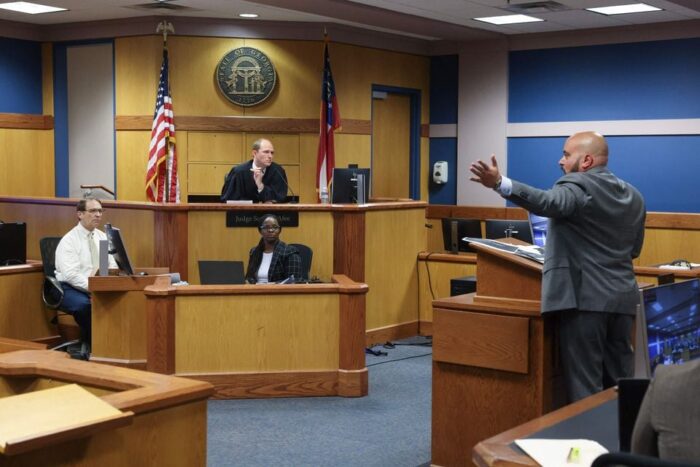In the aftermath of a truck accident, victims often find themselves thrust into a complex legal landscape. While many cases are resolved through negotiations or settlements, some proceed to trial, where the intricacies of the legal system come to the forefront.
According to TruckInfo.net, trucking companies litigating small verdicts (under $1 million) often see plaintiff payments of $406k to $449k 95% of the time. For cases over $1 million, the mean plaintiff payment was $3.1 million, as per the latest data from 2019. Settlements are significantly higher when child injuries or fatalities are involved.
Understanding the stages and specifics of a truck accident trial is crucial for those seeking justice and compensation. In this article, we will explore the intricate stages of a truck accident trial. We will also highlight state-specific laws and the expertise of local attorneys.
Initiating the Lawsuit Process

Source: hhplawgroup.com
Commencing the legal journey involves the meticulous filing of a lawsuit. Plaintiffs, commonly the victims of a truck accident, draft a detailed legal complaint outlining the incident’s specifics.
This document identifies the responsible parties, such as the truck driver and their employer. It also provides a narrative that sets the stage for the unfolding legal proceedings. Attorneys carefully craft this initial document to establish a strong foundation for the case.
Discovery and Investigation
The discovery phase serves as a critical investigative period, where both parties exchange essential information. Attorneys dive into accident reports, witness statements, and any other available evidence.
According to the National Institute of Justice, discovery is the pretrial stage facilitating the exchange of information between parties involved in litigation.
This exhaustive investigation aims to paint a vivid and complete picture of the events leading to the truck accident. It involves scrutinizing every detail, anticipating potential challenges, and uncovering any hidden aspects that may influence the trajectory of the case.
The information gathered during this phase becomes the backbone of the legal arguments presented during the trial.
Mediation and Settlement Attempts

Source: lawdepot.com
Preceding the trial, parties often engage in mediation, a process facilitated by a neutral third party. This alternative dispute resolution method offers a platform for amicable negotiations, attempting to reach a settlement without resorting to a full-blown trial.
The mediator plays a crucial role in guiding discussions, helping both sides explore potential compromises and solutions. Successful mediation can save all involved parties the considerable time, expense, and emotional stress associated with a protracted legal battle.
In fact, Black’s Law Dictionary notes that according to the most recent data, almost 95% of outstanding lawsuits end in a pre-trial settlement. This means that just one out of every twenty personal injury lawsuits gets decided in a court of law by a judge or jury.
Pretrial Motions and Hearings
In the lead-up to the trial, attorneys may strategically file pretrial motions to address specific legal issues or request actions from the court. These motions serve to shape the legal landscape, addressing procedural matters and legal specifics before the trial formally begins.
Pretrial hearings provide a platform for both sides to present key arguments, allowing the court to resolve disputes, and streamline the upcoming trial proceedings. This phase ensures that the trial unfolds with clarity and adherence to legal standards.
The Trial Itself

Source: bostonglobe.com
The trial stands as the centerpiece of the legal process. Attorneys meticulously present their evidence, examine witnesses, and construct compelling legal arguments before a judge and, in some instances, a jury.
The adversarial nature of the trial allows each side to articulate its version of events. Both sides engage in a strategic battle to persuade the court of the merits of their case. The trial is a carefully orchestrated legal performance, requiring attorneys to navigate the complexities of courtroom procedures while presenting a compelling and persuasive narrative.
State-Specific Legislation Impact

Source: monderlaw.com
Navigating the specifics of state-specific legislation is particularly crucial in regions witnessing frequent truck accidents. Local laws play an essential role in shaping the dynamics of the trial, influencing critical aspects like liability, damages, and procedural matters. In states like Missouri where truck crashes are frequently witnessed, understanding the specific legal landscape becomes even more important.
Local courtroom procedures in Missouri adhere to a structured process. Once a lawsuit is initiated, it undergoes a series of pretrial motions and hearings where attorneys navigate the intricacies of state law.
TorHoerman Law notes that the Missouri court system emphasizes adherence to rules and regulations, ensuring a fair and transparent legal process. During the trial itself, evidence is presented methodically, and attorneys engage in strategic legal arguments.
Missouri cities such as St. Louis are known as transportation hubs of the region. Consequently, they often witness a higher frequency of truck accidents. In such urban centers, the impact of state-specific legislation on legal proceedings becomes even more pronounced.
In the context of Missouri’s legal system, a St. Louis truck accident attorney becomes an essential partner in the pursuit of justice. Their familiarity with local laws, courtroom procedures, and the intricacies of truck accident cases positions them as invaluable allies for victims. These specialized attorneys provide much-needed legal guidance, significantly assisting clients in navigating legal complexities and securing favorable outcomes.
Verdict and Appeal

Source: usustatesman.com
Following the exhaustive presentation of evidence and legal arguments, the trial culminates in a verdict. This crucial moment marks the court’s decision on the issues at hand.
If either party is dissatisfied with the outcome, the legal journey may extend to the appeals process. An appeal involves a higher court reviewing the proceedings of the trial court to ensure that legal standards are meticulously adhered to.
This additional layer of scrutiny provides an opportunity for a modified or overturned decision. This adds a final chapter to the formal legal process for resolving a truck accident case. The verdict and potential appeal represent the culmination of a rigorous legal battle, signaling the conclusion of the trial phase.
Ending Note
The complex journey of a truck accident case to trial underscores the importance of thorough legal processes, state-specific legislation, and expert guidance. While settlements often prevail, trials serve as a critical arena for comprehensive examination and presentation of evidence.
State laws, exemplified by Missouri’s structured legal system, play a pivotal role in shaping trial dynamics. Specialized attorneys, particularly in high-accident regions like St. Louis, become invaluable allies.
The verdict and potential appeals encapsulate the culmination of a meticulous legal battle, emphasizing the need for adherence to legal standards.
